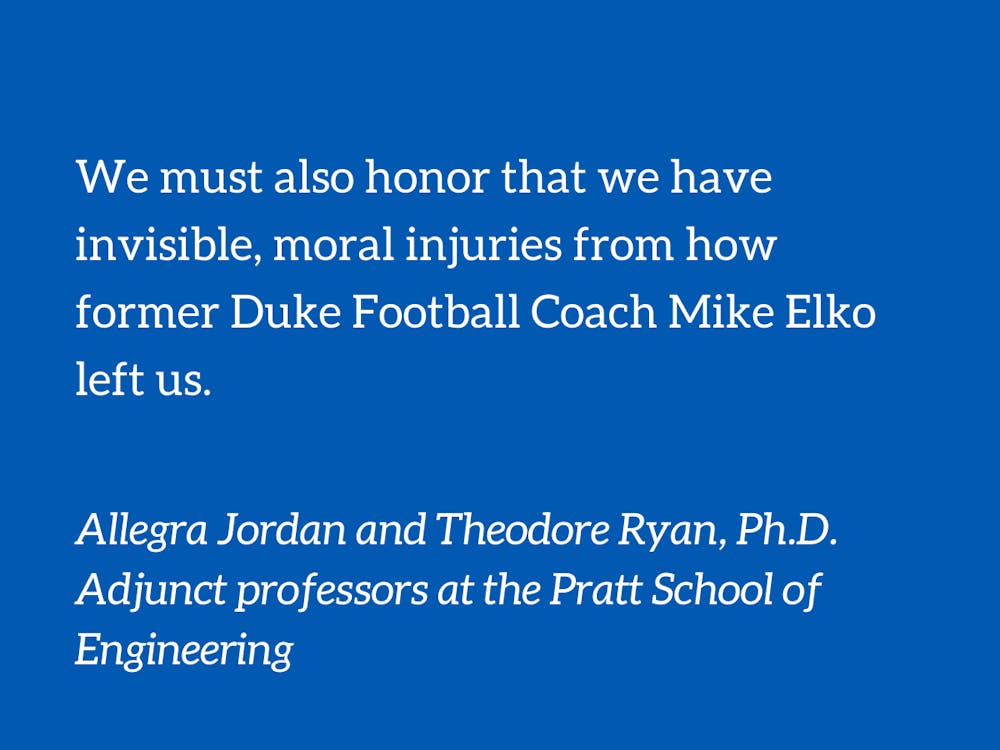Our community welcomes our new Duke football head coach Manny Diaz. We can be happy for our new future. We must also honor that we have invisible, moral injuries from how former Duke Football Coach Mike Elko left us.
Unfortunately, moral injuries linger. At Duke, we have the moral imagination to heal these injuries in a healthy way.
Leaders can resign. Fleeing under the cover of darkness is the problem.
“But, sports is a business,” some say. Tell that to the human heart. Betrayal is bad business. It’s costly. No good business leader flees under the cover of darkness.
“Midnight Mike” Elko was a trusted authority figure. He asked for sacrifices by his players on behalf of the football program, based on the value of mutual commitment that goes beyond mere self-interest. When we are committed to each other, we say goodbye properly.
How did Coach Elko leave?
Monday, Nov. 27, before our class started, we saw a video of Elko landing in College Station, Texas around 3 a.m. He descended from the steps of a private jet. We saw a clip of him dancing with his new administrators. He scheduled a 10 a.m. call with the Duke football team to inform them about his decision. The Zoom meeting lasted less than four minutes.
This semester we taught a core leadership course at Duke’s Pratt School of Engineering to more than 150 graduate engineers. One of us — professor Allegra Jordan — encountered a student of ours on the way to class. He had a cough from the cold air at the Pitt football game, doing work for the program. This student took great pride in being at Duke, not just for its academic excellence but also because he bought into Duke as a caring and ethical community. He beamed speaking about the win and his role in helping the team. He didn't know Coach Elko fled before dawn. The color drained from his face as he heard the news. He stuttered in disbelief. “Why didn’t he tell us?”
One leader may wound, but a community of leaders can help heal. We offer three reflections. These can help you with this community betrayal, and when you are personally betrayed:
- Ask, "What happened to me?", not, "What did I do wrong?" Hold yourself in warm regard as you reflect on what happened. Affirm that others act out of their own character, not because of who you are. You deserve better than what your betrayer did to you.
- Ask, "Will I let Mike Elko's violating his promises veto me?" Will we let how Elko acted keep us from having high standards for ourselves and others? Will what Elko did diminish or strengthen our commitment to act with integrity and care?
- Regardless of what Elko did, ask, "Who am I committed to becoming?" If you’re not sure of your answer, consider the idea Aristotle gave Western Civilization: You are here to flourish. Flourishing for Aristotle meant achieving “arete,” a holistic concept that calls us to be our best self, to live virtuously, to develop and use all of our powers and, as a by-product, attain genuine happiness. With that magnificent vision in mind, will you let the actions of a self-centered football coach rob you of who you can be?
"How do I handle the bitter times when a person who said they'd care for me abandons me?" The question of how we deal with "joy snatched away" is a vital life skill. We hope these suggestions help you flourish in the face of the irreversible, and, at times, unbearable, betrayals in life.
Allegra Jordan and Theodore Ryan, Ph.D., are adjunct professors at the Pratt School of Engineering.
Editor's Note: Information about the Zoom call between players and former head football head coach Mike Elko was independently verified by The Chronicle with a source who had direct knowledge of the call.
Get The Chronicle straight to your inbox
Signup for our weekly newsletter. Cancel at any time.

